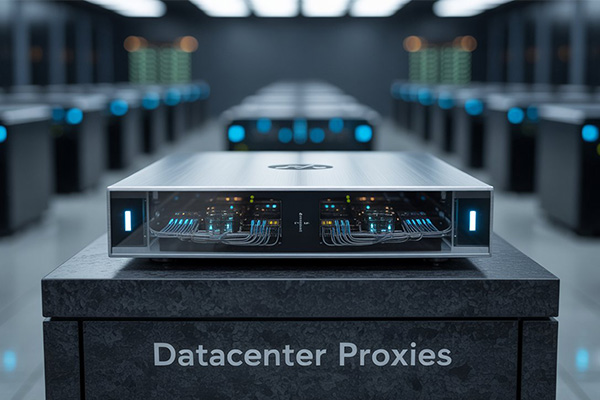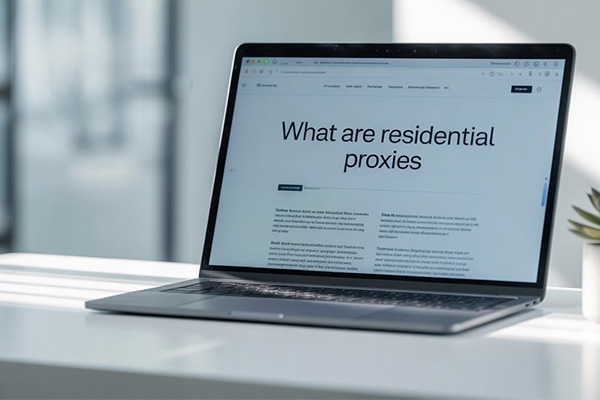Datacenter vs Residential Proxies: Key Differences Explained
While both Residential and Dedicated Proxy IPs share the primary function of masking your real IP address, they differ in several important ways. In this article, we’ll explore these differences in detail to help you determine which proxy type best suits your business needs.
Datacenter and residential proxies mainly differ in their origin and level of anonymity. Residential proxies use IP addresses tied to actual internet users via ISPs, making them appear more legitimate and less likely to be blocked by websites. Datacenter proxies come from data centers, offering faster speeds and lower costs but can be more easily flagged since they originate from servers rather than individual users.
What Are Datacenter Proxies?

Datacenter proxies are IP addresses that are not associated with an Internet Service Provider (ISP). Instead, they originate from data centers or cloud hosting providers and offer users private IP authentication and anonymity.
Unlike residential proxies, datacenter proxies are shared by multiple users and come from non-ISP sources, which means some websites may flag or block these IPs more easily. Discover our list of the top 5 Datacenter Proxy providers reviewed for 2025.
Residential Proxies:
Legitimacy – Since Residential Proxy IPs are assigned by real ISPs, they appear genuine and trustworthy. In contrast, Datacenter Proxies are generated in bulk by data centers or cloud providers, making them easier to detect and blacklist, especially if sourced from unreliable providers. Additionally, top-tier residential proxies can maintain the same IP address for extended periods if needed.
Lower risk of blacklisting – Because they mimic real user IPs, residential proxies are much harder for websites to blacklist, ensuring smoother and more reliable scraping activities.
Higher cost – Residential proxies are more expensive to acquire and maintain due to their legitimate sourcing and complexity.
What Are Residential Proxies?
Residential proxies use genuine IP addresses ass igned by Internet Service Providers (ISPs) to real homeowners. Because these IPs are linked to actual physical devices, they closely mimic organic human behavior online.
igned by Internet Service Providers (ISPs) to real homeowners. Because these IPs are linked to actual physical devices, they closely mimic organic human behavior online.
A key aspect of residential proxies is their ethical use. It’s important that these proxies are obtained transparently, with homeowners giving informed consent and receiving compensation for participating in the proxy network. Unfortunately, not all providers follow this practice—some homeowners may unknowingly have their devices included due to unclear or misleading terms of service.
Using residential proxies obtained through unethical means carries significant risks such as disrupted business operations, reputational damage, and potential legal issues. To help you make the right choice, let's dive into our list of the 5 Best Residential Proxy providers today.
Datacenter Proxies:
Non-physical – Datacenter proxies are artificially generated, so websites can often detect their use. However, they still mask your real IP and provide anonymity, especially when purchased from reputable providers. Using private datacenter proxies significantly reduces the risk of bans or blacklisting. They are commonly used for tasks like market research.
Fast and efficient – Known for their speed and high performance, datacenter proxies are ideal when you need to complete projects quickly. To maximize their effectiveness, it’s important to buy from trusted providers and have the technical knowledge to manage them. We provide comprehensive documentation and expert support to help you get started.
Cost-effective – Datacenter proxies offer an affordable option, especially when buying in bulk or on a budget. While they are less expensive than residential proxies, they still deliver strong security and fast speeds—provided you choose a reliable provider.
Choosing Between Datacenter and Residential Proxies
Residential proxies mimic natural user behavior with their constantly rotating IP addresses, helping safeguard your online identity. In contrast, datacenter proxies offer high-speed, high-performance IPs that enable you to efficiently handle data-heavy tasks.
| Type of Proxy | Sourcing | Block Risk | Pricing | Speed |
|---|---|---|---|---|
| Datacenter Proxies | Artificial IPs from datacenters | Depends on provider | Budget-friendly | Very high (but varies by provider) |
| Residential Proxies | Legit IPs from ISPs | Very low | Expensive | High |
Now that you understand the differences between residential and datacenter proxy servers, it’s time to decide which one best fits your scraping needs.
Priorities:
When choosing between residential and datacenter proxies, the key question is whether you require high security and stealth, or if speed and simple IP masking are your main concerns.
Residential Proxies: These proxies don’t leave digital footprints and avoid triggering security alerts, making them ideal for gathering sensitive public data or large volumes of information. Many businesses rely on residential proxies for tasks like review monitoring and ad verification. Typically, residential proxies offer wider geographic coverage than datacenter proxies. However, if you need to scrape data from a very specific location, check if your provider has proxies in that area.
Datacenter Proxies: These work best if you have technical expertise and opt for private datacenter proxies, allowing you to better manage your digital footprint while benefiting from faster speeds.
Alternative Option – ISP Proxies:
You might also consider ISP proxies (also called static residential proxies), which combine features of both datacenter and residential proxies. For more details, check out our article on ISP vs. residential proxies.
❓ Frequently Asked Questions
What is the difference between a residential proxy and a datacenter proxy?
Residential proxies come from Internet Service Providers (ISPs), using real user IPs tied to actual locations, which offers higher legitimacy and anonymity but at a higher cost. Datacenter proxies originate from data centers, providing faster speeds and lower prices but usually with less anonymity. Both types are effective for web scraping; the choice depends on your budget, speed requirements, and privacy needs.
What is the difference between a datacenter and an ISP proxy?
ISP proxies are a hybrid of datacenter and residential proxies. While both datacenter and ISP proxies are hosted on servers, ISP proxies are registered with ISPs, making them appear more legitimate and less likely to be blocked than standard datacenter proxies.
What is a datacenter proxy server?
A datacenter proxy server acts as an intermediary, routing your internet traffic through a separate IP address. Unlike residential proxies, datacenter proxies are not linked to physical locations or ISPs. They typically offer high speed and performance, ideal for bandwidth-heavy tasks like web scraping.
What is the difference between residential and private proxies?
Residential proxies use IP addresses assigned by ISPs to real users, providing higher anonymity by mimicking genuine residential traffic. Private proxies, usually sourced from data centers, offer dedicated IP addresses exclusively for one user, providing speed and stability.
What is the difference between residential and dedicated proxies?
Residential proxies rotate IPs from real devices periodically, while dedicated proxies assign a single, static IP to a user, ensuring consistent identity.
What are the other types of proxies?
Proxies can be categorized by protocol, access type, and more. Common types include:
Mobile proxies: IPs from real mobile devices.
HTTP(S) proxies: High-performance proxies for web traffic filtering.
SOCKS5 proxies: Proxies using the SOCKS protocol, suited for streaming or P2P sharing. Some VPNs offer SOCKS5 as an added feature.
Are proxy locations important?
Yes, proxy location matters because some content is geo-restricted, accessible only from certain regions. For example, a website might allow access only through US-based proxies.
How are datacenter IP blocks different?
Datacenter IPs often come from the same subnet, so if one IP gets blocked, other IPs from that subnet are likely to be blocked as well.